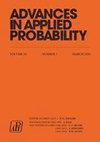$\mathbb{H}^d中渗流中的细端团簇$
IF 1.2
4区 数学
Q3 STATISTICS & PROBABILITY
引用次数: 0
摘要
摘要考虑一个很好地嵌入双曲空间$\mathbb{H}^d$中的图上的伯努利键渗流,它允许$\mathbb{H}^d$的等距的传递作用。设$p_{\text{a}}$是所有渗流参数的上确界,使得$\mathbb{H}^d$的无穷远点不在具有正概率的固定顶点的簇的边界上。那么,对于任何参数$p<p_{\text{a}}$,几乎可以肯定的是,每个渗流簇都是细端的,即只有一个端点的点边界。本文章由计算机程序翻译,如有差异,请以英文原文为准。
Thin-ended clusters in percolation in
$\mathbb{H}^d$
Abstract Consider Bernoulli bond percolation on a graph nicely embedded in hyperbolic space
$\mathbb{H}^d$
in such a way that it admits a transitive action by isometries of
$\mathbb{H}^d$
. Let
$p_{\text{a}}$
be the supremum of all percolation parameters such that no point at infinity of
$\mathbb{H}^d$
lies in the boundary of the cluster of a fixed vertex with positive probability. Then for any parameter
$p < p_{\text{a}}$
, almost surely every percolation cluster is thin-ended, i.e. has only one-point boundaries of ends.
求助全文
通过发布文献求助,成功后即可免费获取论文全文。
去求助
来源期刊

Advances in Applied Probability
数学-统计学与概率论
CiteScore
2.00
自引率
0.00%
发文量
64
审稿时长
6-12 weeks
期刊介绍:
The Advances in Applied Probability has been published by the Applied Probability Trust for over four decades, and is a companion publication to the Journal of Applied Probability. It contains mathematical and scientific papers of interest to applied probabilists, with emphasis on applications in a broad spectrum of disciplines, including the biosciences, operations research, telecommunications, computer science, engineering, epidemiology, financial mathematics, the physical and social sciences, and any field where stochastic modeling is used.
A submission to Applied Probability represents a submission that may, at the Editor-in-Chief’s discretion, appear in either the Journal of Applied Probability or the Advances in Applied Probability. Typically, shorter papers appear in the Journal, with longer contributions appearing in the Advances.
 求助内容:
求助内容: 应助结果提醒方式:
应助结果提醒方式:


